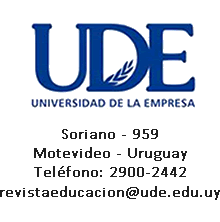Spanish
DOI:
https://doi.org/10.48163/rseus.2020.81138-154Keywords:
SpanishAbstract
This work aims to deepen the development of certain aspects and characteristics that comprise the concept of Emotional Intelligence (EI) of boys and girls identified with High Intellectual Abilities (ACI). The population was made up of 14 families, whose participation varied throughout these meetings; They were previously identified with ACI indicators by the team of the Neuropsychology Service, Children's Area, UNC, Argentina (SNPI). For the purposes of this project, a qualitative analysis of the device was carried out with a workshop modality, which is made up of four meetings, implemented by SNPI professionals. The conclusions showed an impact on the recognition and management of children's emotions. and girls, both within the family and in relationships with peers,
managing to generalize both the techniques and the concepts worked on in the workshops in other contexts. Where the construction of personal resources was promoted that led to greater satisfaction and bio-psychosocial emotional well-being. Likewise, the space is taken as a place of care and enjoyment, favoring the increase of the emotional and social skills of said population.
Downloads
Additional Files
Published
How to Cite
Issue
Section
License
Política para revistas de acceso abierto
Los autores/as que publiquen en esta revista aceptan las siguientes condiciones:
a. Los autores/as conservan los derechos de autor y ceden a la revista el derecho de la primera publicación, con el trabajo registrado con la licencia de atribución de Creative Commons (CC-BY), que permite a terceros utilizar lo publicado siempre que mencionen la autoría del trabajo y a la primera publicación en esta revista.
b. Los autores/as pueden realizar otros acuerdos contractuales independientes y adicionales para la distribución no exclusiva de la versión del artículo publicado en esta revista (p. ej., incluirlo en un repositorio institucional o publicarlo en un libro) siempre que indiquen claramente que el trabajo se publicó por primera vez en esta revista.






















